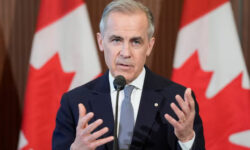
Deterrence is necessary in Asia in the face of “threats from the Communist Chinese,” US Defense Secretary Pete Hegseth said in Manila on Friday as he opened his first visit to Asia in his role under a cloud of scrutiny for discussing American war plans on Signal.
The US has an “ironclad commitment” to the US-Philippines alliance, Hegseth said in opening remarks ahead of a meeting with Philippine President Ferdinand “Bongbong” Marcos Jr.
“Friends need to stand shoulder to shoulder to deter conflict and ensure there’s free navigation whether you call it the South China Sea or the West Philippine Sea,” Hegseth said, referring to the strategic, resource-rich waterway that China claims most of.
The defense chief’s visit comes as the Trump administration has signaled their aim to prioritize “deterring war with China.” Hegseth warned US allies in Europe earlier this year that Washington can no longer be primarily focused on security on that continent as it looks to its “peer competitor” in Asia and the US southern border.
The Philippines has been on the front lines of China’s increasingly aggressive posture in Asia. Beijing seeks to assert its claim over the bulk of the South China Sea, despite an international ruling denying its sovereignty over the waterway.
Hegseth will also visit US ally Japan during his tour, which comes as he seeks to tamp down controversy around his decision to share information about US military strikes on Houthi targets in Yemen on the commercial messaging app Signal.
Hegseth in particular has been under fire among the senior Trump administration officials who were part of the group, after The Atlantic magazine revealed the details that the defense chief shared in the Signal chat about the pending strike, including the timing and types of aircraft. Hegseth defended himself in remarks Tuesday, telling reporters, “I know exactly what I’m doing.”
Despite the shadow of the American furor over the situation, Hegseth’s visit and rhetoric on US alliances, however, is likely to be welcomed in Asia, where American allies have been closely watching how the Trump administration will manage longstanding military relationships.
Trump has repeatedly questioned the structure of US military alliances and whether the US was getting enough out of such partnerships and basing arrangements, including those in Asia.
The American military presence in Asia, which includes tens of thousands of troops stationed in sprawling bases in Japan and Korea, is seen by allies to act as a critical counterbalance in a fractious region where China has been rapidly expanding its military might and a belligerent North Korea has been empowered by closer ties with Russia.
In the Philippines, the US defense commitment is seen as key deterrent for Chinese aggression. Chinese and Philippine vessels have engaged in multiple collisions and face-offs over the past year as tensions elevated around hotspot areas of contention in the South China Sea.
Hegseth’s expression of an “ironclad” commitment to the Philippines’ defense echoes language used by former President Joe Biden, who championed US alliances and sought to bring American partners in Asia closer together on security cooperation in the face of what the US sees as a growing security threat from Beijing.
China in recent weeks has sought to bolster its relationships with US and allies and trade partners as it seeks to capitalize on uncertainty in US trade and security relationships. In a meeting with South Korean and Japanese counterparts last week, Chinese Foreign Minister Wang Yi called on the countries to strengthen communication and deepen cooperation.





